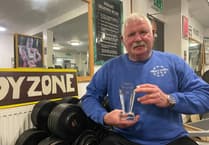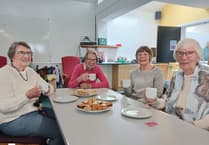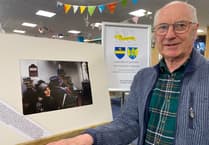At a bustling local cafe, a small group of people gather. They know little about one another and come from all walks of life, but they have one thing in common—they are all involved in the Read Easy programme, which provides one-on-one coaching to adults who struggle with reading.
The group of readers and coaches have all come to share their experiences working with Read Easy—a courageous decision for the readers because, as Okehampton's Read Easy lead, Richard Clear, tells me, many adults struggling with literacy often go to great lengths to conceal their challenges, fearing shame, embarrassment and humiliation.
Brian, one of the readers, shares a confession. He would pretend to forget his glasses to hide his difficulties (I'm sorry, can you read that for me? I've forgotten my glasses).
Across the table, fellow reader Liam reveals her coping strategy: "Every time my husband and I went out for a meal, I always used to get him to order for me. He didn't know I struggled reading. He just took it as normal," she says.
Most of us take the ability to read for granted. Many of us learnt to read as children at school, easily navigate signage, official letters and paperwork, browse the internet, and enjoy a good novel before bed. However, an inability to read can make life much more challenging. Imagine being unable to read a menu, a doctor's letter and road signs or, as Rupert candidly shares, relying on packaging design to identify products on supermarket shelves.
But this is not a tale of hardship; it's a story of hope, and it is one of the reasons that readers and coaches have come together—to let other struggling readers know that illiteracy can be overcome and that learning to read can be a life-changing experience.
Liam says she now reads to her husband (they are enjoying Dr Seuss, she says) and now orders for herself at restaurants. Rupert and Kenus, too, have seen their love for reading grow, and Rupert even aspires to take over the bookkeeping for his business in the future.
For Brian, the journey towards literacy has been transformative, not just intellectually but emotionally: "I never used to go out; I'd be stuck at home doing nothing. I didn't have many interests before, but now I'm out all the time. Now people have to phone me before they visit. As my confidence grew, I started going to Men in Sheds," he says.
The coaches, Maggie, Sue, and Gail, radiate pride as they recount their pupils' remarkable progress. They explain how readers no longer refer to themselves as "thick" or "stupid," and Gail describes how her pupil has gone from struggling with the alphabet to reading short stories.
And what would they say to people debating whether or not to improve their reading ability? Brian sums it up neatly: "Just get on with it and don't worry," he says, smiling.
For more information or to learn to read, contact Richard on 01837 54804.



